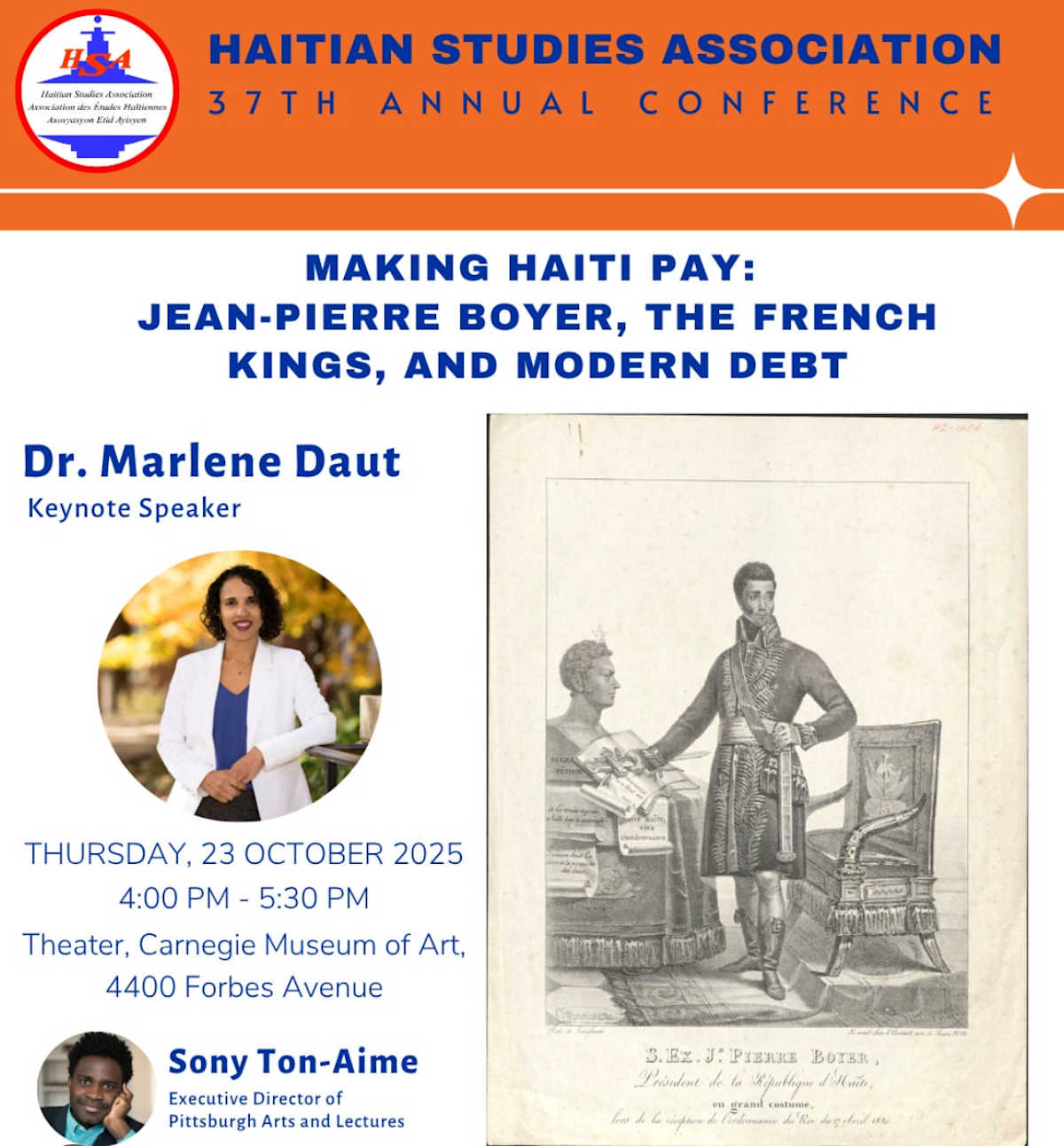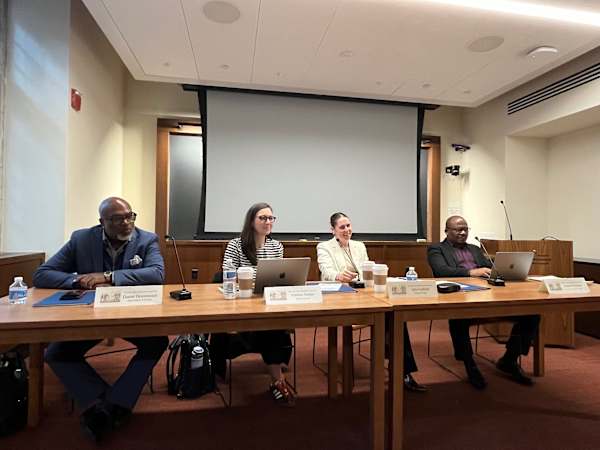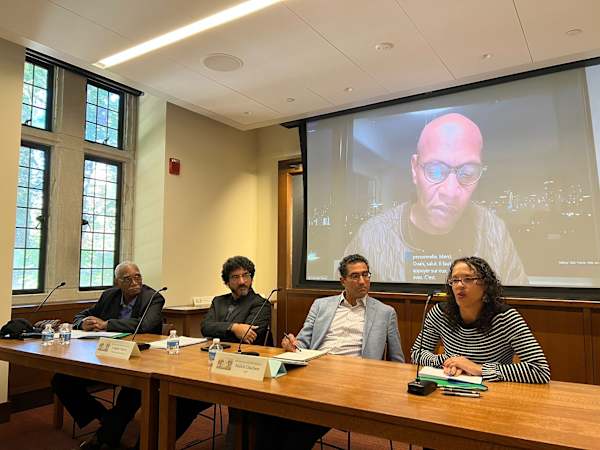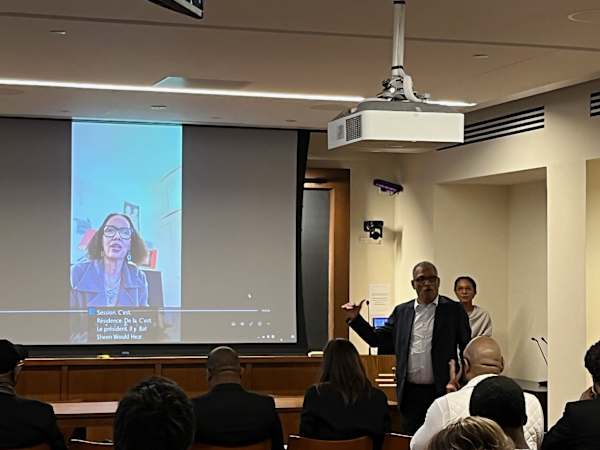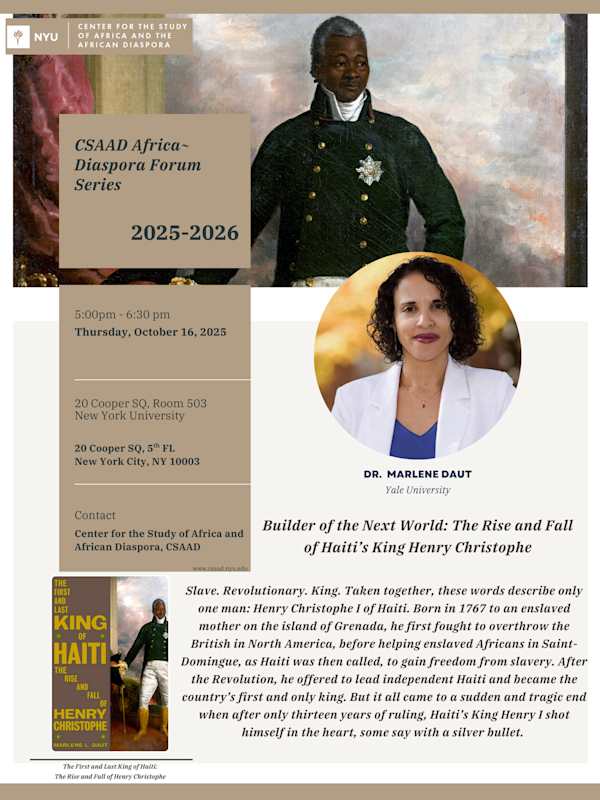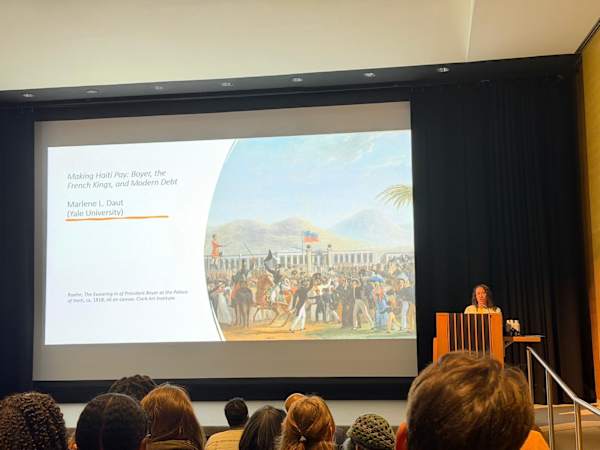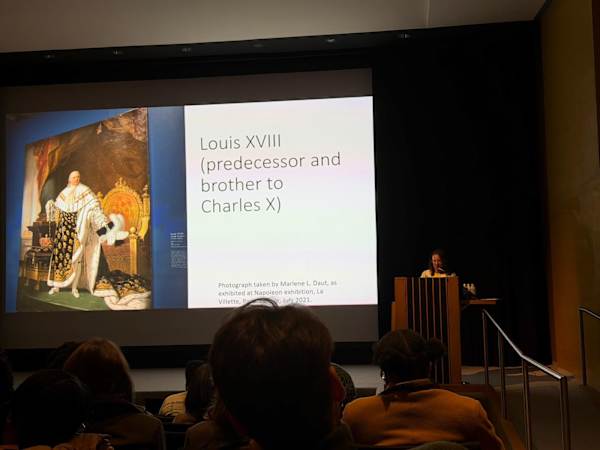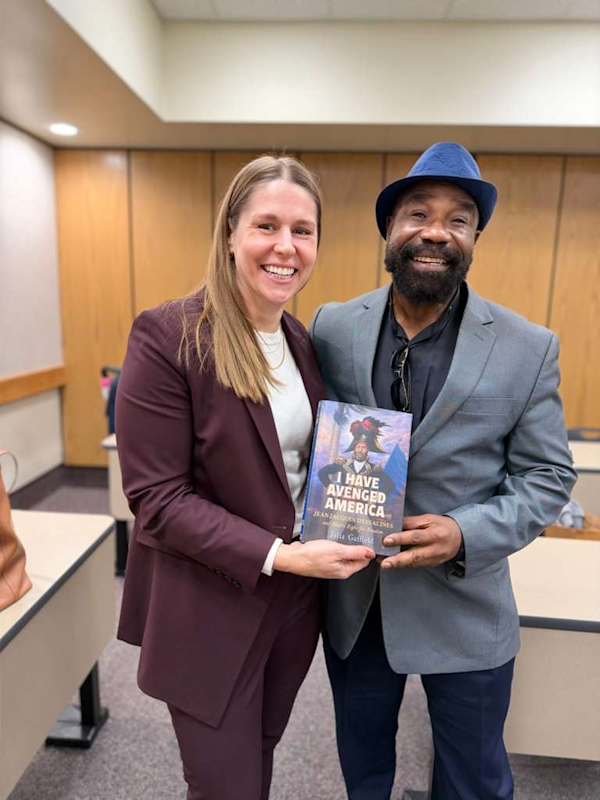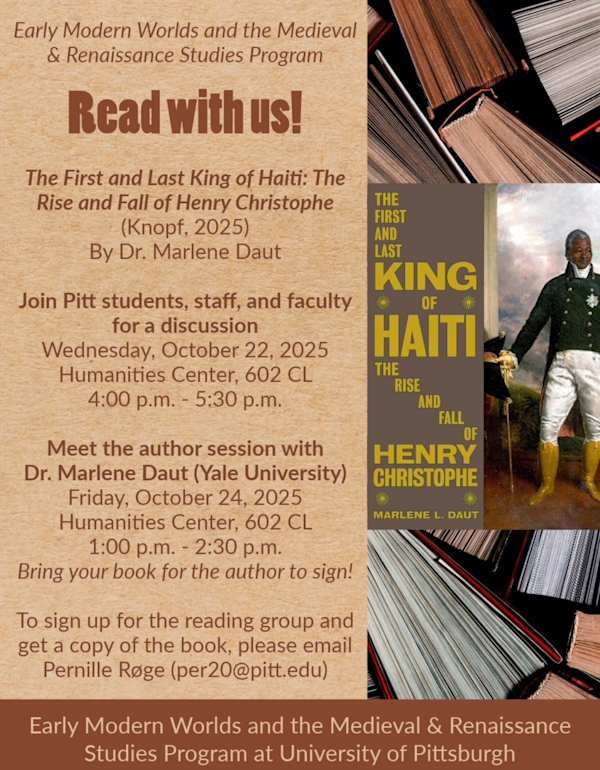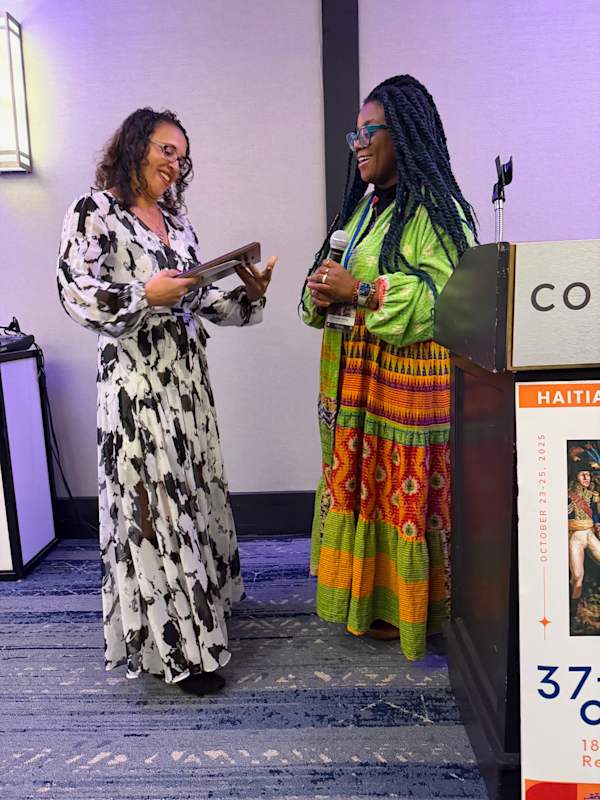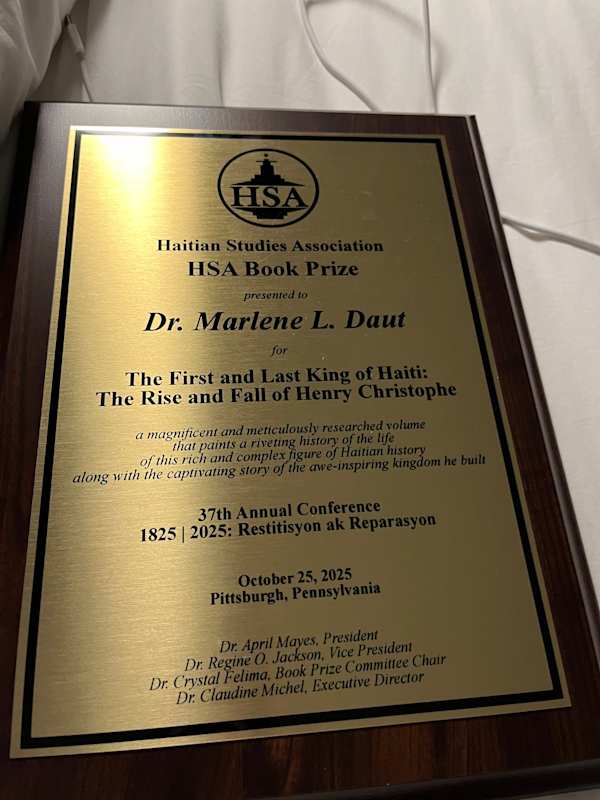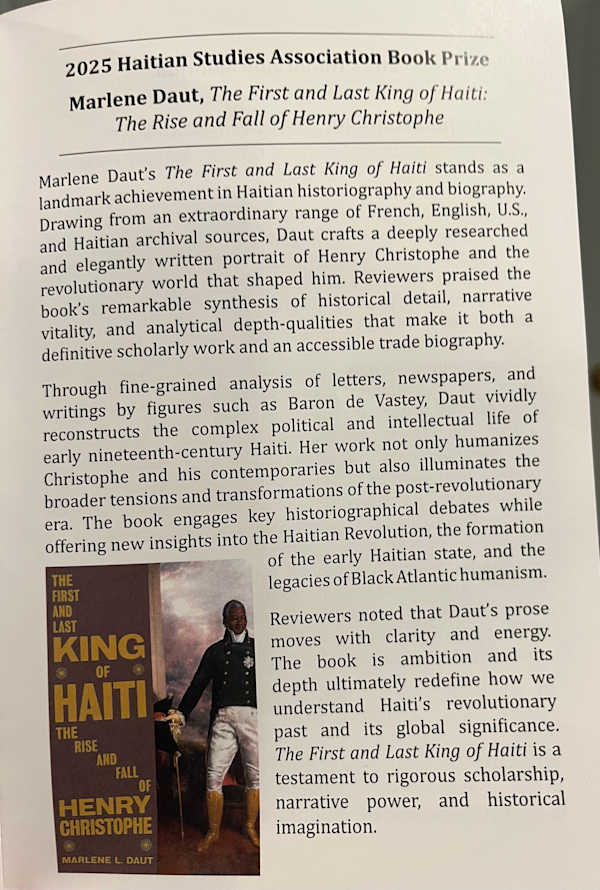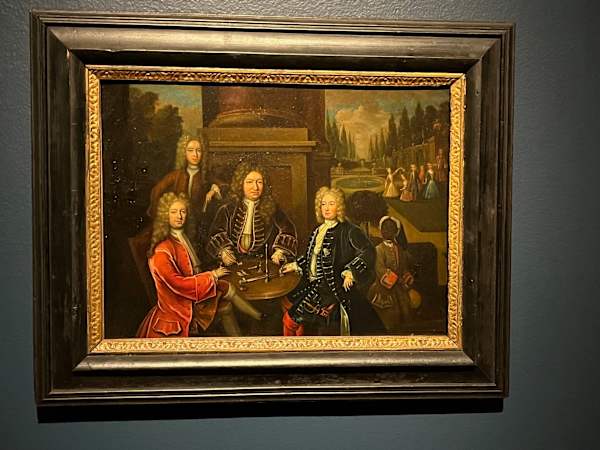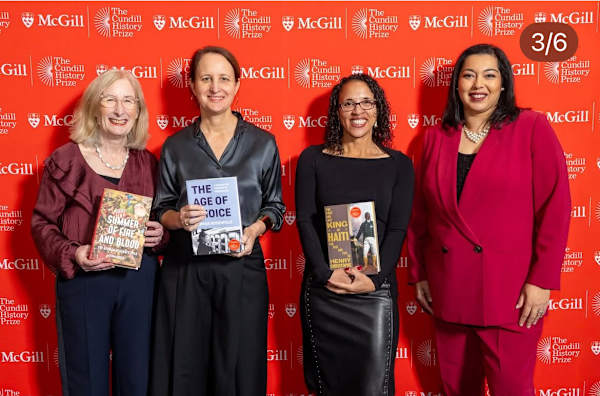By Marlene L. Daut
The month of October was a very busy one for me. First, my colleague Pierre Saint-Amand and I hosted a conference to analyze, discuss, and deliberate the implications of the bicentennial of the 1825 indemnity “agreement” with France that impoverished Haiti. Participants included Julia Gaffield, Daniel Desormeaux, Jean Casimir, Chelsea Stieber, Grégory Pierrot, Jean-Marie Théodat, Kaiama L. Glover, Yanick Lahens, Malick Ghachem, and Lewis Clorméus.
The conversations were enriching, eye-opening, and instructive. My only regret is that we failed to take a group photo, so these random snapshots will have to suffice!
My bookish wanderings next took me to NYU’s Center for the Study of Africa and the African Diaspora, where I was hosted by none other than the Michael Gomez, whom I first met when we presented on the same panel in Nantes, France way back in 2015 for the United Negro College Fund. At NYU, naturally, I presented on the King of Haiti. I was so pleased to find a packed room filled with both professors, students, and staff from the university.
(CSAAD poster for Marlene Daut's talk at NYU: "Builder of the Next World: The Rise and Fall of Haiti's King Henry Christophe")
The very next week, I had the true pleasure to visit the University of Pittsburgh for the 37th Annual Conference of the Haitian Studies Association. Although I was originally scheduled as a panelist for a session on Caribbean Biographies (where I presented with Chelsea Stieber, Julia Gaffield, and Christina Davidson, author of a great new book, Dominican Crossroads: H. C. C. Astwood and the Moral Politics of Race-Making in the Age of Emancipation), imagine my immense surprise when a few months before the conference the board asked me to present the keynote, too.
The HSA conference theme was 2025: Restitisyon ak Reparasyon, so this invitation was both an honor to me personally and enriching for me professionally, as I have been working on the question of the indemnity and reparations and repayment for many years now. Adding to the honor, the keynote took place in the theater of the Carnegie Museum of Art, one of the most famous and revered art museums in the United States.
The honors only continued. Just before the conference, I learned from the board president, April Mayes, that The First and Last King of Haiti had been selected as the winner for the 2025 Haitian Studies Association Book Award. It is hard to put into words how meaningful this recognition is for me. I attended my first HSA conference in 2005 when the gathering was convened at the University of Massachusetts-Boston. In the many intervening years, HSA has been, for me, the most robust site of collaboration, engagement, comradery, support, and friendship. I have attended the conference almost every year for the past twenty years, and to therefore receive this award felt like a true homecoming.
The conference happened to also coincide with a very interesting exhibit at the Carnegie Museum of Art: Fault Lines: Art, Imperialism, and the Atlantic World. I was very surprised and pleased to find there a painting by the French artist Roehn of what is usually called The Swearing In of President Boyer at the Palace of Haiti. Caveat: it’s actually not a depiction of his swearing in, and I’ll be publishing my research on that soon! In any case, it was so nice to see the painting in person, though, I must say that it was much smaller in size than I had imagined.
Other items of interest from the exhibit involved the section devoted to the Cuban freedom fighter José Antonio Aponte, whose famous Book of Paintings inspired around half the objects on display; and this painting of the founder of Yale, Elihu Yale, and his family with an enslaved Black child in the background, a stark reminder that nearly every university in this country has a history of slavery to contend with and for which to account.
("Elihu Yale with Members of his Family and an Enslaved Child," attributed to John Verelst, ca 1719)
Finally, the month of October culminated with a trip to Montréal to attend the Cundill History Prize Festival. I haven’t talked about it much, honestly, because it has kind of remained unbelievable to me, but The First and Last King of Haiti initially made the longlist, then the shortlist, and in the end was selected as one of three finalists for the Cundill History Prize, awarded by McGill University and the Cundill Foundation.
Although my book did not ultimately win the grand prize, being selected as one of three finalists for this award (which received a record 402 submissions!) provided me with so many opportunities. For one thing, I got to attend the festival and meet my brilliant co-finalists: Lyndal Roper, whose book Summer of Fire and Blood ultimately won the prize, and Sophia Rosenfeld, nominated for her stellar book The Age of Choice. In connection with the prize, I also had the opportunity to do an interview with BBC History Extra, to write an article for LitHub where I recommended five essential books on Haitian history, all by Haitian authors, and my book was featured in a radio spotlight on CBC and reviewed in the Literary Review of Canada.
The Cundill/McGill also ran a pretty impressive media campaign. One of the Instagram reels they posted, for example, featured the judges discussing why they had selected each of the three books; another Instagram campaign featured three interesting facts/anecdotes from each book; while yet another showed compelling items each author came across in the research for their respective books. Although it was a bit nerve-wracking not to know who won the grand prize until the very last minute (we did not find out until after 10 PM eastern on the last day of the festival at the evening gala!), this was an experience that I will not soon forget. Without a doubt, history and historians still matter.
And that's a wrap for the month of October! Stay tuned for updates from my November bookish wanderings to Tulane, the Gilder Lehrman Center, and the Miami Book Fair.
